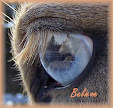In my last post I highlighted three popular ingredients in commercially prepared flysprays. If you missed it, you can read it here
If you have decided that commercially prepared, chemical-laced flysprays are something you'd rather not use, then the next step is to find some that will do the job just as well or perhaps better.
Let's see what else we can do.
Feed-through Weaponry
 There are a number of feed-through supplements that may help ward off biting flies.Most all of them contain garlic as the primary ingredient. Some have added brewers yeast, and apple cider vinegar. You can purchase the pre-mixed stuff from a variety of manufacturers, or you can DIY. I buy bulk garlic from a reputable organic wholesaler and mix a tablespoon or so into my horses' feed once a day. You can also add ACV to their drinking water. Add a very small amount at first, then gradually increase as your horse becomes accustomed to the taste.
There are a number of feed-through supplements that may help ward off biting flies.Most all of them contain garlic as the primary ingredient. Some have added brewers yeast, and apple cider vinegar. You can purchase the pre-mixed stuff from a variety of manufacturers, or you can DIY. I buy bulk garlic from a reputable organic wholesaler and mix a tablespoon or so into my horses' feed once a day. You can also add ACV to their drinking water. Add a very small amount at first, then gradually increase as your horse becomes accustomed to the taste.Diatomaceaus Earth is another feed through method of controling the fly population. It does not contain insectcide at all. If you're not familiar with DE, it is explained here. As a feed-through it works internally on parasites, and externally in the manure that is passed. Think microscopic shards of fossilized bone. Like little razor blades, the silica pierces the ecto-skeleton of insects and kills them. DO NOT FEED INDUSTRIAL DE. Food Grade only, or something that is prepared specifically for consumption by livestock and horses such as Red Lake
Pros: Convenient and generally contain no toxins. Relatively inexpensive as far as supplements go ranging from about 60 to 90 cents per serving. Many have the NASC (National Animal Supplement Council) seal of approval. Some contain additional ingredients like MSM, Omega 3s and diatomaceaous earth, which are all good for your horse.
 Cons: As with many supplements, your fly control feed through may contain additional, unwanted ingredients, which tend to boost the price but add no particular effectiveness or value to the product. When it does include additional beneficial ingredients, you need to look at how much is really in there. (Are you paying extra for the ingredient when all they've added is a trace amount? Read the Label!) Also, it's tough to get horses to eat some of these products. Often times you find a lot of wasted feed and supplement in the bottom of the feed dish. Frustrating when that happens.
Cons: As with many supplements, your fly control feed through may contain additional, unwanted ingredients, which tend to boost the price but add no particular effectiveness or value to the product. When it does include additional beneficial ingredients, you need to look at how much is really in there. (Are you paying extra for the ingredient when all they've added is a trace amount? Read the Label!) Also, it's tough to get horses to eat some of these products. Often times you find a lot of wasted feed and supplement in the bottom of the feed dish. Frustrating when that happens.Flymasks, sheets, leg wraps and leg bands
This is a usually a very good line of defense against biting flies and mosquitoes. Most horses tolerate this protective gear fairly well. Masks, sheets and leg wraps come in a variety of styles and fabrics. And if it's important to you or your horse, a variety of colors or patterns. Masks to keep insects out of ears and eyes, flysheets for the body and leg wraps to keep those pesky flies off of pasterns and lower legs. Nothing more worriesome than hearing your beloved horse continually stomping in an effort to knock flies off.
Pros: Flymasks and sheets are nontoxic! Flymasks protect sensitive ears and eyes from those tiny annoying gnats, that can do real damage. Left unchecked, horses can do a lot of damage to itchy eyes by rubbing them on anything they can find, resulting in infection or worse, damage the eye permanently.
The additional benefit of masks and sheets is they can protect light-skinned horses against sunburn, especially those with facial markings over sensitive areas like the nostrils, eyes and lips, (off-topic, but it's not a bad idea to cover these areas with a zinc ointment, such as diaper rash medicine to completely block out the suns rays). Cons: Some horses don't tolerate this gear very well and do anything within their means to remove it. Which pretty much ends with the mask or sheet totally destroyed. Leg wraps, if they are tolerated, often come loose and you get to spend your precious barn/riding time looking for lost wraps in the pasture. Furthermore, some of us tend to overdo on the bug protection, leaving our horses in danger of being made fun of by his pasture mates.
Cons: Some horses don't tolerate this gear very well and do anything within their means to remove it. Which pretty much ends with the mask or sheet totally destroyed. Leg wraps, if they are tolerated, often come loose and you get to spend your precious barn/riding time looking for lost wraps in the pasture. Furthermore, some of us tend to overdo on the bug protection, leaving our horses in danger of being made fun of by his pasture mates.
More Suggestions for your Arsenal
Installing fans in stalls and run-in sheds can help keep flies at bay. They cannot deal with the breeze that is created. In addition to being feed-through solution, spreading diatomeceous earth on your manure pile and in any area that attracts flies can help kill adults and larvae. It's also a natural deodorizer and will repel flies as well. Fly strips and fly bait traps are somewhat effective, but they are messy and I personally don't like seeing masses of dead flies....ick!
In my next installment, I will discuss some essential oils for fly and mosquito control. Until then,
Happy Trails
Bella







0 comments: